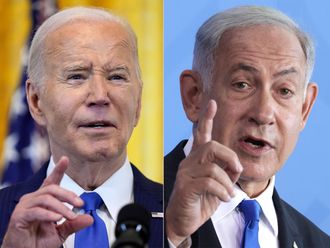Cairo: In 1980, Tehran severed diplomatic links with Cairo to protest Egypt’s peace treaty with Israel and its asylum offer for Shah Mohammed Reza Pahlavi, deposed by Iran’s Islamic Revolution a year earlier.
The Egyptian-Iranian ties were mostly soured in the era of the Egyptian president Hosni Mubarak, who supported Iraq in its eight-year war against Iran.
Mubarak repeatedly accused Iran of igniting unrest in the region and sponsoring militant groups. Cairo was also resentful of Tehran naming one of its streets after Khaled Al Islambouli, an army officer who assassinated late Egyptian president Anwar Al Sadat.
While welcoming Iran’s 1979 Islamic Revolution, the Brotherhood leaders of the time were reluctant to lend full backing to the new Islamist rulers in Tehran.
“We backed Khomeini politically because he led his people to get rid of an autocrat and helped them regain their freedom,” said Omar Al Telmesini, the then Supreme Guide of Egypt’s Brotherhood, referring to the spiritual leader of the Iranian revolution. “But ideologically speaking, Sunnism is something and the propagation of Shiism is another,” Al Telmesini added in 1982.
Since Mubarak’s toppling, Iran has sent several officials to Cairo obviously to weigh at firsthand chances for breaking the ice between the two regional heavyweights. Meanwhile, Iran has invited several public delegations to visit, where they have been reassured about Tehran’s readiness to offer economic assistance to Cairo.
Although Mursi made a historic trip to Tehran in August last year to attend a summit of the Non-Aligned Movement, he and his officials look cautious about responding to Iran’s outreach.
Iranian officials have repeatedly said that warm ties with Cairo will encourage an estimated 5 million Iranians to visit Egypt annually, thereby propping up the vital Egyptian tourism sector, battered by two years of turmoil.
“Religious dialogue among the seminaries of Iran and Egypt will be an obstacle to extremist moves in the Muslim world,” Speaker of the Iranian parliament Ali Larijani was quoted as saying recently.
“The rich culture and civilisational links between the Iranian and Egyptian nations would prepare an appropriate ground for strengthening relations in all fields.”
Tehran’s pursuit of better links with Cairo has, meanwhile, displeased some experts in Iran.
“Although Egypt wields significant influence in the Islamic and Arab world, Iran cannot pay a heavy price for friendship with a country that for economic reasons is completely dependent on the West, Saudi Arabia and Qatar,” wrote Hassan Hanizadeh in an editorial carried by Iran’s semi-official Mehr News Agency.
“Each time Egypt makes any move towards Iran, these two countries have threatened to cut off its financial and economic assistance. This continues despite the victory for the Muslim Brotherhood in Egypt, which does not have a positive attitude towards the Saudi and Qatari regimes,” Hanizadeh, an expert on international affairs, added.
To him, Mursi’s visit to Tehran to attend the NAM conference was a big chance to solve problems between Egypt and Iran. “But his behaviour at this conference proved that he cannot cross the red lines drawn for him by Saudi Arabia and Qatar…. Iran is displaying an excessive desire to establish ties with Egypt, while this desire is not seen in Egypt.”
Both countries maintain an interest section office in each other’s capital.
Standing next to his Iranian counterpart, Ali Akhbar Salehi, at a press conference in Cairo last month, Egyptian Foreign Minister Mohammad Kamel was at pains to dispel concerns in the Arab Gulf about an Egyptian-Iranian rapprochement.
“The security of the Gulf is the security of Egypt,” Kamel said. “Egypt’s relations with any party will not be at the expense of the security of the Gulf.”
Gulf countries have repeatedly accused Iran of meddling in their affairs and inciting the region’s Shiite minority.











